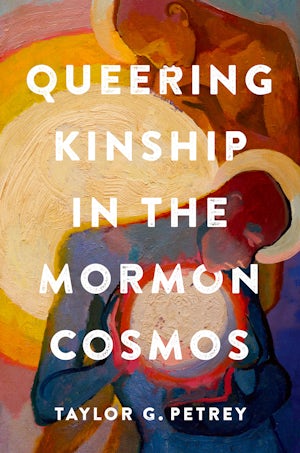In Queering Kinship in the Mormon Cosmos (University of North Carolina Press, 2024), Taylor G. Petrey uses the past to look forward. Petrey—himself a Latter-day Saint, to use the language now preferred by those once called Mormons—suggests that the “hierarchy of heterosexual love over other human bonding” is a rather “strange” and recent development within this tradition. Early Mormonism, by contrast, was about kinship at least as much as it was about family. That’s correct, but the ambitions of Joseph Smith—the church’s founding prophet—were even broader and bolder.
For Smith, Mormonism’s founding prophet, the model for human kinship was God. God wasn’t a three-in-one, immaterial, unchanging, apathetic deity, but an exalted Father in relationships of love and unity with a material Son and a non-corporeal Holy Spirit. There is a lot to unpack here. For example, are the members of the Godhead male? Petrey points to far more complicated language and imagery within both Mormonism and Christianity more broadly, but he also notes that those who insist on the maleness of the Father, Son, and Spirit produce “an acutely homoerotic scene of divine love.” The point is that a queer reading of “these supposedly stable symbols of hetero-masculinity reveal[s] a wonderfully fluid and ambiguous resource for an alternative kinship system to heteropatriarchy.” Humans with all sorts of sexualities, bodies, and identities could find an invitation to kinship within this theological vision.
And there’s more. Smith’s followers articulated the idea of a Heavenly Mother alongside God the Father. Church leaders have eschewed fleshing out her cosmic role. They underscore her importance but say relatively little about her. The church has excommunicated a number of theologians and activists who have carved out a greater space for Heavenly Mother in Mormon piety, whereas other Latter-day Saint women depict Heavenly Mother as an archetype of essentialist womanhood.
But Joseph Smith is more famous for what he did than what he espoused. The Mormon prophet was sealed in marriage to thirty or so women. He had sex with a good number of his wives. What should we make of this starting point? Did Joseph Smith introduce plural marriage in order to satisfy his sex drive? Or did he marry women to live out a theological principle? The historian Richard Bushman observed that Smith “did not lust for women so much as he lusted for kin.” Other scholars have rejected Bushman’s assertion, treating it as perhaps the wishful thinking of a scholar beholden to his faith.
